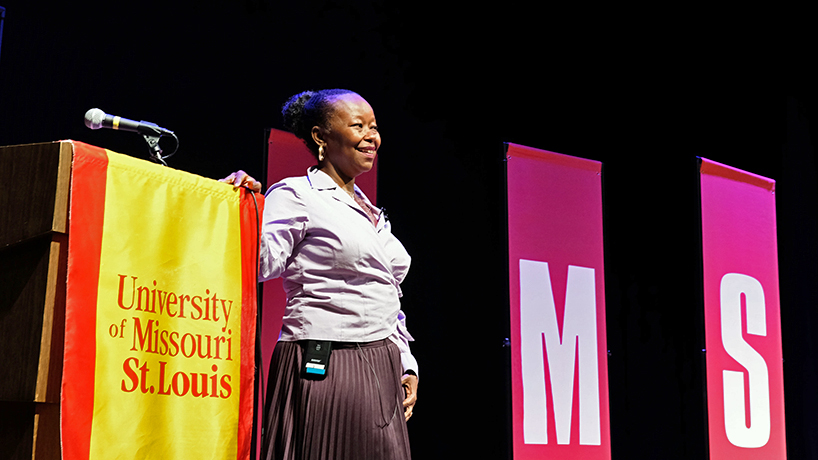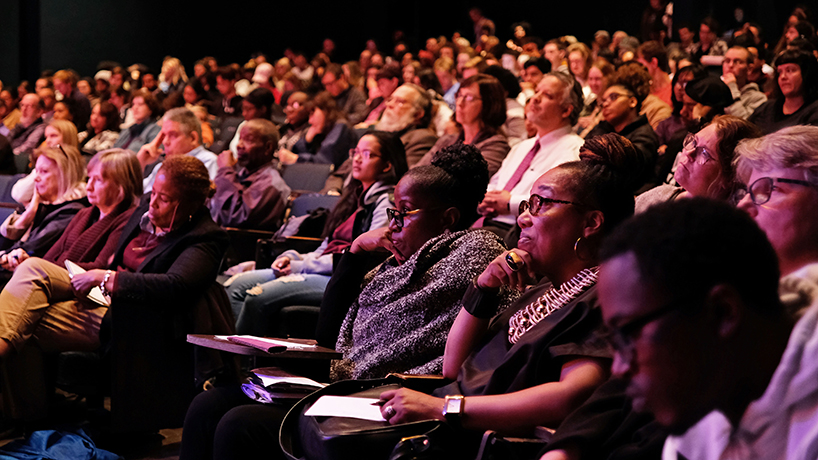
Farah Griffin, the William B. Ransford Professor of English and Comparative Literature and African American Studies at Columbia University, delivers a lecture on James Baldwin’s novel “If Beale Street Could Talk,” the UMSL Common Read book. (Photos by Mona Sabau)
Students and faculty members from departments spread across the University of Missouri–St. Louis have embraced the inaugural Common Read, James Baldwin’s novel “If Beale Street Could Talk.”
More than 300 filed into the J.C. Penney Auditorium last Thursday as Farah Griffin, the William B. Ransford Professor of English and Comparative Literature and African American Studies at Columbia University, delivered a lecture on lessons that can be drawn from the story of Tish and Fonny 45 years after the book was published.
“I am so honored to have the opportunity to speak with you this afternoon about my favorite Baldwin novel,” Griffin said as she began her talk. “You are helping to ensure that a new generation engages with this important text, so thank you for inviting me to participate in this experience by doing something that I truly enjoy doing, and that’s reading together in community.”
Griffin, the director of the Institute for Research in African-American Studies, focused her lecture on the radical – unconditional – love that exists in the novel between not only Tish and Fonny but members of their families after Fonny is falsely accused of rape.
It persists even as the quest for justice proves elusive, and Fonny ends up incarcerated.
“Each time we care for and act out of love for each other, it seems that kind of love might be the basis of justice,” Griffin told the audience. “That kind of love might be the condition of true freedom. That love – a hard, difficult, unsentimental love – has power beyond wealth, greed and physical might.”
It takes a tragedy, a grave injustice for Baldwin to deliver the novel’s overarching message.
“For Baldwin, the very act of putting stories of suffering on display is necessary for the acquisition of justice, and restorative justice seeks to offer repair – to put things as they should be,” Griffin said. “As a form, the novel is a place that raises questions about the possibilities and goals of justice. It allows us to imagine what a society governed by an ethics of care, a society based upon restoring and repairing those who have been harmed – what might that society look like?
“It does not offer the possibility of a cure. The scar is still there. It will become a part of the new society, who is scarred but not broken.”
Approximately 300 community members and UMSL students, faculty and staff attended Farah Griffin’s talk last Thursday.
Kimberly Welch, an assistant professor of English at UMSL, was one of the many enthusiastic attendees of Thursday’s lecture. She counted it as a personal thrill to hear Griffin share her insights.
“It was amazing,” she said. “Dr. Griffin is the scholar on African American Literature. Her own work has influenced my work. ‘Who Set You Flowin’?‘ – her first book about the African American during migration – heavily influences my own work.”
Welch has incorporated “If Beale Street Could Talk” into two of her courses – “American Literature after 1865” and a special topics course called “Disrupting Prison Spaces” – for the fall semester at UMSL. Two of her students were among those interviewed about the book last Monday during a segment about the Common Read on “St. Louis on the Air.”
The committee of organizers behind the Common Read might have expected a professor such as Welch to add Baldwin’s novel to her syllabus. But they’ve been blown away to see so many other faculty members – 50 by an unofficial estimate – do the same, including in areas such as social work, nursing and business.
Thursday’s lecture was one more reminder of how widespread the buy-in has been.
“I could not believe my eyes,” said Birgit Noll, associate dean of the College of Arts and Sciences. “I was hoping for maybe 150 or 200 people. It would have been a huge success. I think we had more than 300 people in the audience. Not only that, but they were from all over campus, and there were people from within the community. There are two reading groups at the University City Library that have been reading the book.”
The signature lecture was just one of the events tied to the Common Read on the calendar during October. UMSL will hold a screening of the 2018 film adaptation of “If Beale Street Could Talk” at 2 p.m. Wednesday in the J.C. Penney Auditorium.















